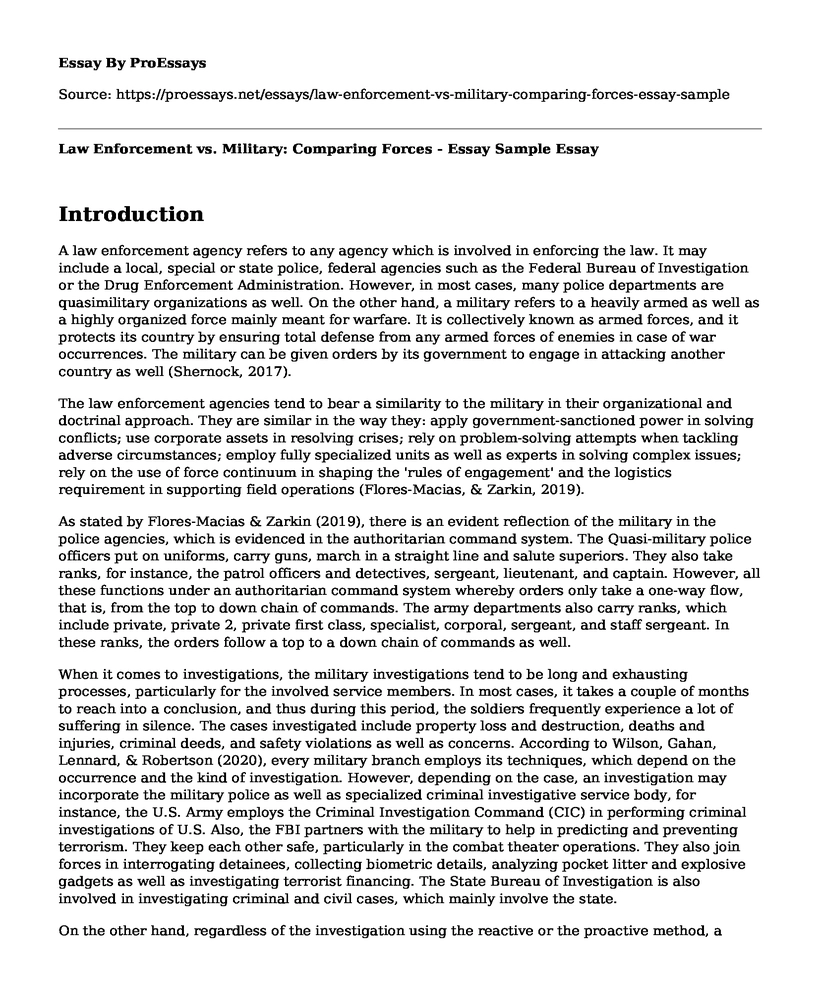Introduction
A law enforcement agency refers to any agency which is involved in enforcing the law. It may include a local, special or state police, federal agencies such as the Federal Bureau of Investigation or the Drug Enforcement Administration. However, in most cases, many police departments are quasimilitary organizations as well. On the other hand, a military refers to a heavily armed as well as a highly organized force mainly meant for warfare. It is collectively known as armed forces, and it protects its country by ensuring total defense from any armed forces of enemies in case of war occurrences. The military can be given orders by its government to engage in attacking another country as well (Shernock, 2017).
The law enforcement agencies tend to bear a similarity to the military in their organizational and doctrinal approach. They are similar in the way they: apply government-sanctioned power in solving conflicts; use corporate assets in resolving crises; rely on problem-solving attempts when tackling adverse circumstances; employ fully specialized units as well as experts in solving complex issues; rely on the use of force continuum in shaping the 'rules of engagement' and the logistics requirement in supporting field operations (Flores-Macias, & Zarkin, 2019).
As stated by Flores-Macias & Zarkin (2019), there is an evident reflection of the military in the police agencies, which is evidenced in the authoritarian command system. The Quasi-military police officers put on uniforms, carry guns, march in a straight line and salute superiors. They also take ranks, for instance, the patrol officers and detectives, sergeant, lieutenant, and captain. However, all these functions under an authoritarian command system whereby orders only take a one-way flow, that is, from the top to down chain of commands. The army departments also carry ranks, which include private, private 2, private first class, specialist, corporal, sergeant, and staff sergeant. In these ranks, the orders follow a top to a down chain of commands as well.
When it comes to investigations, the military investigations tend to be long and exhausting processes, particularly for the involved service members. In most cases, it takes a couple of months to reach into a conclusion, and thus during this period, the soldiers frequently experience a lot of suffering in silence. The cases investigated include property loss and destruction, deaths and injuries, criminal deeds, and safety violations as well as concerns. According to Wilson, Gahan, Lennard, & Robertson (2020), every military branch employs its techniques, which depend on the occurrence and the kind of investigation. However, depending on the case, an investigation may incorporate the military police as well as specialized criminal investigative service body, for instance, the U.S. Army employs the Criminal Investigation Command (CIC) in performing criminal investigations of U.S. Also, the FBI partners with the military to help in predicting and preventing terrorism. They keep each other safe, particularly in the combat theater operations. They also join forces in interrogating detainees, collecting biometric details, analyzing pocket litter and explosive gadgets as well as investigating terrorist financing. The State Bureau of Investigation is also involved in investigating criminal and civil cases, which mainly involve the state.
On the other hand, regardless of the investigation using the reactive or the proactive method, a similar and systematic procedure is followed. The stages involved include instigation, pilot investigation, investigative evaluation, suspect management, evidential evaluation, charge, case management, and lastly, the court. The law enforcement agencies investigate matters such as natural deaths, homicides, accidental deaths, suicides as well as other types of crimes. However, for effective investigations, some circumstances, such as the interpretations involving bloodstains, fluids, DNA, and fingerprints, a specialized investigative body is required to handle that. However, the Federal Bureau of Investigation, being a primary federal agency in law enforcement, therefore takes the responsibility. The FBI is also responsible for investigating any allegations concerning violations of civil rights regulations (Wilson, Gahan, Lennard, & Robertson, 2020).
However, despite the law enforcement agencies and the military both emphasizing training, the police should aim to improve their skills by adopting the military approach to training (Shernock, 2017). Modern law enforcement agencies can learn much from how the military efficiently prepares its people to achieve difficult duties in challenging surroundings. Besides, it can learn from military-level training techniques and tactics too that can effectively impact on change of operations from a headship, organizational as well as officer safety viewpoint.
References
Flores-Macias, G. A., & Zarkin, J. (2019). The Militarization of Law Enforcement: Evidence from Latin America. Perspectives on Politics, 1-20. https://doi.org/10.1017/s1537592719003906
Shernock, S. (2017). Changing uniforms: A study of the perspectives of law enforcement officers with and without different military background on the effects of combat deployment on policing. Criminal Justice Policy Review, 28(1), 61-86. https://doi.org/10.1177/0887403414565173
Wilson, L. E., Gahan, M. E., Lennard, C., & Robertson, J. (2020). The forensic intelligence continuum in the military context. Australian Journal of Forensic Sciences, 52(1), 3-15. https://doi.org/10.1080/00450618.2018.1459839
Cite this page
Law Enforcement vs. Military: Comparing Forces - Essay Sample. (2023, Apr 10). Retrieved from https://proessays.net/essays/law-enforcement-vs-military-comparing-forces-essay-sample
If you are the original author of this essay and no longer wish to have it published on the ProEssays website, please click below to request its removal:
- Constitutional Amendments
- Paper Example on Richard Kuklinski's Crimes
- Crime-Related Fear - Essay Sample
- ACLU Advocates for New Immigration Policy in NY: Protecting Immigrant Rights
- Essay Sample on Intelligence for Law Enforcement VS Homeland Security
- Essay on Forensic Investigation of John Smith: D&B Investigations Team Leads
- Law Enforcement in USA: Violating Constitutional Sureties? - Essay Sample







